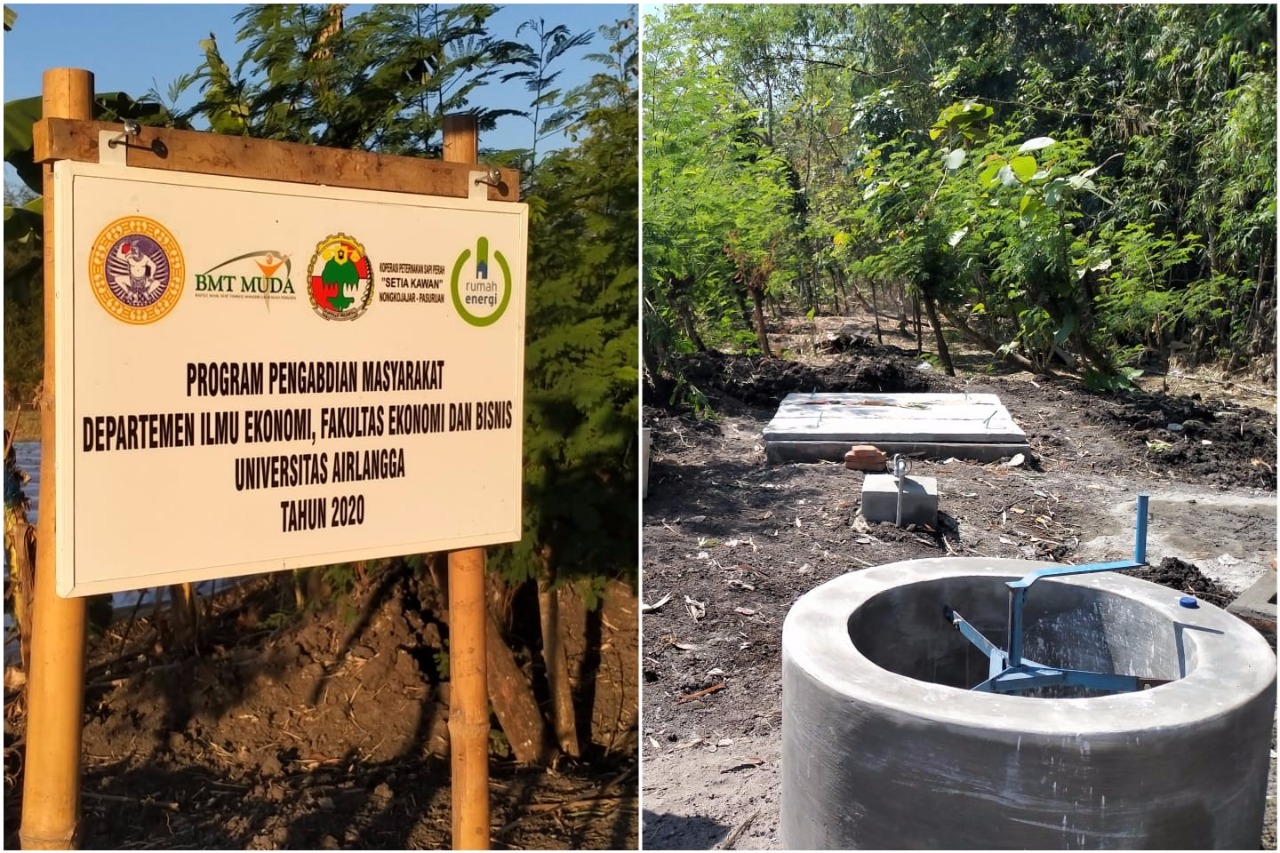UNAIR NEWS – The Community Partnership Program works to help communities become economically self-sufficient. Shochrul Rohmatul Ajija, SE, M.Ec, Rumayya, Ph.D., Akhmad Jayadi, SE., M.Ec.Dev, and M. Khoerul Mubin, SE., M.Ec, and Siti Munawaroh and Risa Aulia, students of Economics, Faculty of Economics and Business, Universitas Airlangga, became part of the team that developed this program.
The formation of community groups aims to carry out service activities to improve the welfare of farmers. This activity is the realization of the community service program funded by the Annual Budget Activity Plan (RKAT) Fund, Faculty of Economics and Business Universitas Airlangga for Fiscal Year 2020.
The community service is located in Jatitengah Village, Sugihwaras Sub-district, Bojonegoro Regency, and is carried out for approximately one month in August 2020. The problem faced by farmer groups in Jatitengah Village is the lack of knowledge about the use of cow dung waste.
Meanwhile, there is a lot of cow dung waste around people’s homes, which causes an unpleasant odor. Then, farmers in Jatitengah Village are also not familiar with the management of biogas installations. Most people still use firewood for cooking.
“Most people probably think cow dung waste is a disgusting thing. However, cow dung has many benefits, “said Shochrul.
He added that cow dung waste is not only used as manure. Through biogas technology, cow dung waste can become an alternative energy source for cooking to replace LPG gas and firewood.
The program is divided into several stages. The first stage is coordination involving several partners, namely the Young BMT Cooperative and the Setia Kawan Nongkojajar-Pasuruan Dairy Cattle Farming Cooperative (KPSP). The BMT Muda Cooperative is the executor of money management by coordinating the contribution system for the procurement of pipes. While the Dairy Cattle Farm Cooperative (KPSP) Setia Kawan Nongkojajar-Pasuruan is in charge of the construction of biogas installations.
Furthermore, a socialization phase was carried out for the community, which was held on Sunday, August 9, 2020. Also attending the activity were Hariyanto and Sholihin, as partners who are experts in processing cow waste, Madi’in, as a representative of the farming community, and a student of Economics at Universitas Airlangga who helped with the activity.
“The socialization activity is aimed at making the farming community more open to using cow dung as a raw material for biogas production,” said Shochrul.
The construction of a biogas installation involves several processes, including land measurement, excavation, casting, installation of digester walls, smoothing walls and floors, formwork (printing), installation of gas pipes, and the formation of the digester and all its components.
Finally, after the construction of the biogas installation is completed, a training phase is carried out on processing cow dung waste into biogas. The training was held on Sunday, August 30, 2020.
Sholihin was a speaker for the training and assisted by economics students at Universitas Airlangga. The training in processing cow dung includes procedures for filling biogas, mixing cow dung, and all procedures related to processing cow dung.
The farming community was very enthusiastic during the training process and paid close attention to the biogas production process. Even the farming community is very supportive of the construction of biogas installations.
“We are happy and grateful for this program because by utilizing cow dung waste, we can save money on purchasing LPG gas, and we can also use the remaining waste as fertilizer,” said a farmer group in Jatitengah Village.
Overall, the community service program activities in Jatitengah Village have been carried out well, and the farming community has given full support for the implementation of the program. Hopefully, in the future, the costs incurred by farmers in Jatitengah Village will be more efficient. Farmers can make maximum use of bio-slurry (biogas waste), and other farmers will be more aware of the use of cow dung waste in biogas, which will encourage these farmers to build biogas installations, and, in the end, the farmers in Jatitengah Village will become more prosperous.
Authors: Risa Aulia & Siti Munawaroh
Editor: Binti Q. Masruroh





